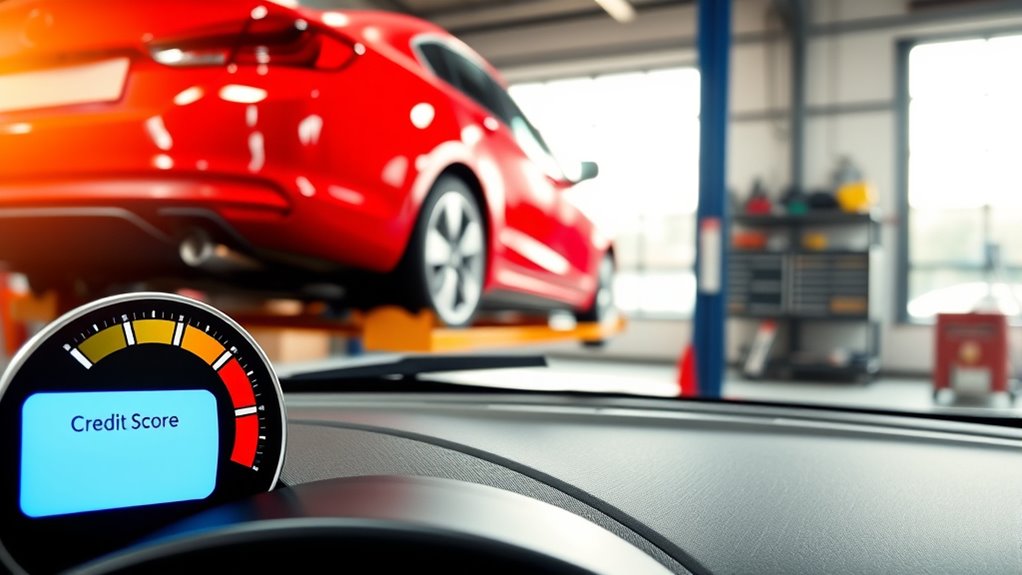Your credit score impacts how easily you can get financing for car repairs. A good score means you’re more likely to qualify for affordable loans and payment plans, helping you cover urgent repair costs without stress. Poor credit can limit your options, often leading to higher-interest loans or even denial. By keeping your credit healthy, you make financing repairs simpler and more affordable. If you want to learn more about improving your credit, keep exploring.
Key Takeaways
- A good credit score makes it easier to qualify for affordable auto repair loans and flexible payment plans.
- Poor credit may lead to higher-interest repair loans or outright denial of financing options.
- Credit checks are often required when applying for auto repair financing or payment plans.
- Maintaining strong credit reduces the financial burden during urgent or costly vehicle repairs.
- Improving your credit score can help you access better financing terms, lowering overall vehicle repair costs.

Your credit score plays a significant role when it comes to financing car repairs, as it directly impacts your ability to qualify for loans or payment plans. When you need urgent repairs, a good credit score can open doors to more affordable financing options, making it easier to cover the costs without straining your budget. On the other hand, a poor credit score can limit your choices, forcing you into higher-interest loans or even denying you credit altogether. This is especially important if you rely on payment plans from repair shops or auto loan providers, which often check your credit history before approving your application.
A good credit score eases access to affordable auto repair financing options.
Your credit score also influences the types of auto insurance policies available to you. Insurance providers frequently assess your credit to determine premiums, with higher scores typically leading to lower rates. If your credit is less than ideal, you might find yourself paying more for coverage, which adds to your overall vehicle-related expenses. This increased cost can make it even harder to manage repair bills, creating a cycle that worsens your financial situation over time. Understanding how your credit impacts auto insurance can motivate you to improve your score, ultimately helping you save money on both repairs and coverage.
Vehicle leasing is another area where your credit score plays a vital role. When leasing a car, lenders scrutinize your credit to assess your reliability in making consistent payments. A strong credit score increases your chances of qualifying for favorable lease terms, such as lower down payments or reduced interest rates. Conversely, if your credit is weak, leasing companies might require larger deposits or deny your application altogether. This can limit your options and force you into less desirable lease terms, making it more costly to get behind the wheel of a reliable car. Improving your credit score not only helps you access better leasing deals but also provides peace of mind knowing you’re viewed as a responsible borrower.
In essence, your credit score influences many facets of vehicle ownership, from the costs of auto insurance to the terms of leasing agreements and the ease of financing repairs. Maintaining a good credit history enables you to secure more affordable solutions during stressful situations like car breakdowns or accidents. It’s worth keeping an eye on your credit report, paying bills on time, and reducing debt to keep your score in good standing. Doing so can make managing car repairs less intimidating and help you keep your vehicle on the road without excessive financial strain.
Frequently Asked Questions
Can I Get Car Repair Financing With No Credit History?
Yes, you can get car repair financing with no credit history. Credit unions often offer auto loans to those with limited or no credit, making them a good option. They may consider your income and employment instead of just your credit score. Shop around, and don’t hesitate to ask about no-credit auto loans. Building your credit now can help you secure better financing options in the future.
How Does a Poor Credit Score Impact Interest Rates?
A poor credit score substantially impacts your interest rate, leading to higher costs on car repair financing. Your credit score influence lenders to see you as riskier, so they charge more to compensate. This interest rate impact means you’ll pay more over time, making it essential to work on improving your credit to access better financing options and reduce overall expenses.
Are There Alternative Financing Options for Bad Credit?
Did you know nearly 80% of consumers with bad credit find alternative lenders for financing? If your credit score isn’t ideal, you can explore options like credit unions, online lenders, or buy here pay here dealerships. These alternatives often offer more flexible terms and can help you rebuild your credit while covering car repairs. Always compare offers and make sure you understand the terms before committing to any financing plan.
Does Paying off My Repair Early Improve My Credit Score?
Paying off your repair early can positively impact your credit score improvement if it lowers your overall debt. By doing so, you demonstrate responsible loan payoff strategies, which lenders view favorably. Timely loan payoff shows you manage credit well, potentially boosting your score. Keep in mind, consistent payments and reducing debt overall are key factors in improving your credit health. So, early payoff can be a smart move for better credit.
How Often Should I Check My Credit Report for Car Financing?
Think of your credit report as a garden needing regular tending. You should check your credit report at least once every three months to guarantee it’s healthy. Regular credit monitoring helps you spot inaccuracies early, so you can address them before they affect your car financing options. Staying vigilant ensures report accuracy, giving you confidence in your financial decisions and helping you maintain a strong credit profile.
Conclusion
Understanding how your credit score impacts your car repair financing can save you time and money. By maintaining a good score, you access better loan options and lower interest rates. Are you willing to overlook the importance of your credit when it could mean the difference between affordable repairs and financial stress? Take control now—your credit score is more powerful than you think, and it can shape your vehicle’s future as much as the repairs themselves.









